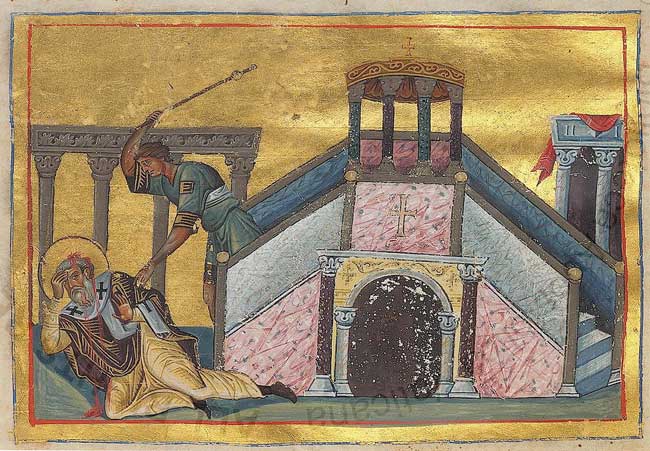Keeping it in the family: James
Short selections of James are read mainly in the latter part of Year B.1 The letter, largely full of practical moral guidance in a largely traditional Jewish mode, sometimes has echoes of Jesus’ teaching. Tradition attributes it to James, the brother of Jesus, and nearly all its content fits with the picture we gain elsewhere of James, clearly a leader in the Jerusalem church in Paul’s day. In this prominence of Jesus’ brother in the community, the early Jesus movement is showing that traditional Jewish family and community values were maintained alongside the more radical prophetic note Jesus often sounded.
The strongest arguments against James’ authorship are the high quality of the Greek the letter is written in and perhaps the apparently settled and socially unequal nature of the Christian synagogue James is challenging about their behaviour. The question of who wrote the letter does not substantially affect its meaning.2
 |
| A portrayal of the martyrdom of James in a mediaeval Orthodox illuminated manuscript, The 1000 year old Menologion (service book) of Basil. Via Wikimedia Commons. |
Paul’s writings reveal his conflict with some Jewish Christians claiming to represent James, and a more Torah-observant version of Christianity. Now James’s letter shows the other side of that conflict, and mounts a critique of what some people, at least, were representing as Paul’s teaching. Those who take faith as a mental or spiritual act of believing something to be true are not doing justice to the practice of Christlike faithfulness I have suggested Paul was talking about. James has just such believers in his sights (which he may also take to be a view held in Paul’s circles) when he bluntly says “faith by itself, if it has no works, is dead.” (Jas 2:17).
Famously, Martin Luther, pursuing his polemics against medieval understandings of the place of works, coined the phrase “by faith alone,” a phrase even more prone to misuse than Paul’s language. The phrase only appears once in the Bible, and it is James who uses it in discussing Paul’s favoured example of Abraham: “You see that a person is justified by works and not by faith alone (Jas 2:24).” Unsurprisingly, Luther did not like the letter, refused to consider it was written by the Lord’s brother or any apostle, and relegated it to the back of his Bible.
There are those who argue for a very real and deep conflict between James and Paul. Certainly there were later versions of both Torah-observant and Law-free Christianity that looked wildly out of step with the mainstream of Christian development. But while I think Paul and James both had their partisans criticising the other’s disciples, both share a belief that God’s people are Jesus’s people, and that believing in Jesus as Messiah includes following the practical teaching of Jesus.
James, when talking about the importance of Torah-observance says: “You do well if you really fulfil the royal law according to the scripture, “You shall love your neighbour as yourself (Jas 2:8)” Paul, when talking about the need to resist imposing circumcision says: “For the whole law is summed up in a single commandment, “You shall love your neighbour as yourself (Gal 5:14).” They have differing emphases, and different audiences, but on the idea that faith and obedience go together in practical ethical service, they both return to one of Jesus’s key verses of the Hebrew Scriptures.
Notes
Propers 17–21, 22nd – 26th Sundays in Ordinary Time
- If it is directly connected with James, the brother of Jesus, it asks major questions of some widely held assumptions about the cultural and linguistic environment of the early Jesus movement.




Comments
Post a Comment